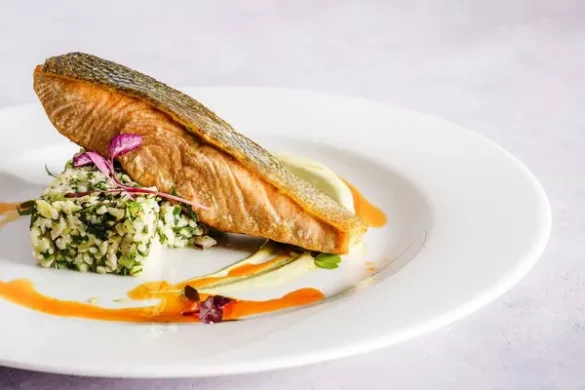Salmon, with its rich, buttery taste and tender texture, is a favorite among seafood enthusiasts worldwide. This versatile fish offers a wide range of culinary possibilities, making it a popular choice for home cooks and professional chefs alike. When it comes to cooking salmon, the preparation method can significantly influence its taste and overall dining experience. This article delves into the art of cooking salmon, exploring the tastiest techniques to unlock its full flavor potential and create unforgettable dishes that will delight the taste buds.
The Flavor of Salmon:
Before we explore the various cooking methods, it’s essential to understand the natural flavor profile of salmon. Salmon’s distinct taste features a delicate balance of sweetness, richness, and umami, attributed to its healthy fat content and high-quality protein. The fish’s flavor also draws influences from its diet and environment, making wild-caught salmon unique from farm-raised varieties.
7 Ways to Cook Salmon
1. Pan-Seared Salmon:

Pan-searing is a classic cooking method that highlights salmon’s inherent flavors while creating a delectable crust on the exterior. To achieve the perfect pan-seared salmon, follow these steps:
Preheat a skillet or frying pan over medium-high heat and add a small amount of oil, such as olive oil or clarified butter.
Season the salmon fillets with salt and pepper or your preferred seasoning blend.
Place the salmon fillets skin-side down in the hot pan and cook for 3-4 minutes until the skin becomes crispy and browned.
Carefully flip the fillets and continue cooking for an additional 2-4 minutes, depending on your desired level of doneness.
Remove the salmon from the pan and let it rest for a few minutes before serving.
2. Baking or Roasting Salmon:
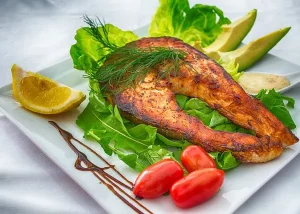
Baking or roasting salmon is a gentle and foolproof method that results in a moist and flaky texture. The even heat distribution ensures the fish cooks evenly while preserving its natural flavors. To bake or roast salmon to perfection:
Preheat the oven to 375°F (190°C).
Place the salmon fillets on a baking sheet lined with parchment paper or foil.
Drizzle olive oil over the salmon and season with your preferred herbs and spices.
Bake or roast the salmon for 12-15 minutes, depending on the thickness of the fillets and your desired level of doneness.
3. Grilling Salmon:
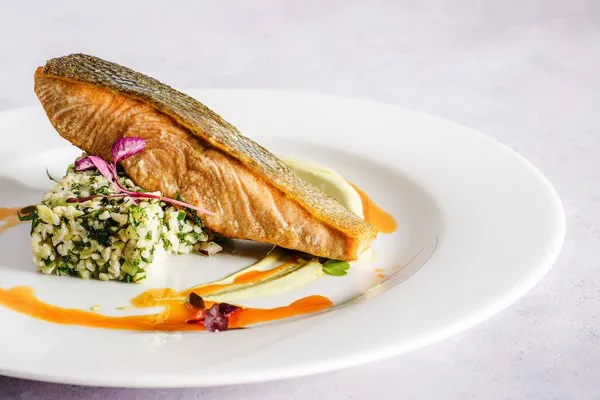
Grilling-Salmon
Grilling salmon over an open flame infuses it with a smoky aroma and creates a delightful caramelized crust. Whether on a barbecue grill or a stovetop grill pan, the grilling method is a fantastic way to enjoy the natural flavors of salmon:
Preheat the grill or grill pan to medium-high heat.
Brush the salmon fillets with olive oil and season with salt and pepper or your favorite seasoning blend.
Place the fillets on the grill and cook for 3-4 minutes per side, depending on thickness and desired doneness.
4. Poaching Salmon:
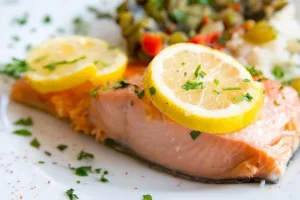
Poaching is a gentle and delicate cooking technique that produces tender and moist salmon with subtle flavors. Poaching salmon in a flavorful liquid infuses it with additional tastes while retaining its natural richness:
In a large skillet or shallow saucepan, bring a poaching liquid to a simmer. The poaching liquid can be water, vegetable or chicken broth, wine, or a mixture of aromatics and herbs.
Carefully place the salmon fillets into the simmering liquid and cook for 5-7 minutes, depending on the thickness of the fillets.
Once cooked, remove the salmon from the liquid and serve.
5. Salmon en Papillote:
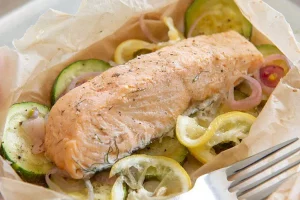
Salmon en Papillote, also known as cooking in parchment paper, is a French-inspired method that seals in the fish’s flavors while mingling with complementary ingredients. This elegant and visually appealing technique creates a complete and harmonious dish:
Preheat the oven to 400°F (200°C).
Cut a large piece of parchment paper or aluminum foil and fold it in half.
On one half of the paper, place a salmon fillet and top it with your preferred seasonings, fresh herbs, vegetables, and a splash of lemon juice or wine.
Fold the other half of the paper over the salmon and start sealing the edges by folding and crimping them to create a tightly sealed packet.
Place the packets on a baking sheet and bake for 12-15 minutes.
6. Teriyaki Glazed Salmon:
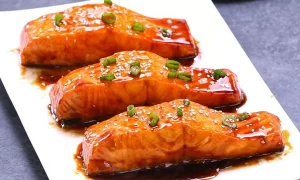
Teriyaki glazed salmon blends Japanese and Western flavors into a delightful and savory fusion. The teriyaki sauce’s umami notes perfectly complement the salmon’s inherent richness:
Mix together a teriyaki glaze with soy sauce, mirin, sake, sugar, ginger, and garlic.
Marinate the salmon fillets in the teriyaki glaze for at least 30 minutes or overnight in the refrigerator.
Grill, bake, or pan-sear the salmon fillets until cooked to your preferred level of doneness, periodically brushing on more glaze for an extra layer of flavor.
7. Salmon in Cream Sauce:
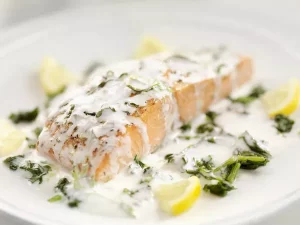
Salmon in cream sauce is a luscious and indulgent preparation that adds richness and depth to the fish’s taste:
In a skillet, sauté garlic and shallots in butter until softened.
Add heavy cream, white wine, and a touch of lemon juice to the skillet, and let the mixture simmer for a few minutes until slightly thickened.
Gently place the salmon fillets into the sauce and cook for 5-7 minutes or until fully cooked and coated with the creamy goodness.
Conclusion:
Salmon, with its distinct flavor and exceptional versatility, lends itself to an array of cooking techniques that can elevate its taste and create unforgettable culinary experiences. Whether pan-seared, grilled, baked, poached, or prepared in parchment paper, each method offers a unique way to unlock the full flavor potential of this treasured seafood. Pairing these cooking techniques with complementary seasonings, herbs, and sauces further enhances the taste of salmon, allowing home cooks and chefs to tailor the dish to suit their preferences and delight the taste buds of every diner.
As with any culinary journey, experimenting with different cooking methods and flavor combinations is encouraged to discover the ultimate tastiest way to cook salmon. By mastering the art of preparing this beloved fish, one can create extraordinary meals that celebrate its natural richness and elevate the dining experience to new heights of pleasure and satisfaction. So, embrace the culinary adventure and savor the multitude of flavors that salmon has to offer, making each dining occasion a feast for the senses.

